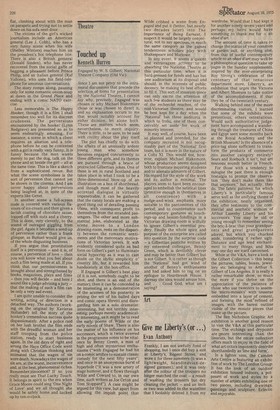Theatre
Touched up
Kenneth Hurren
Engaged by W. S. Gilbert; National Theatre Company (Old Vic) Since I am not privy to the intramural discussions that precede the selection of items for presentation by the National Theatre, I cannot Say why, precisely, Engaged was chosen or why Michael Blakernore chose or was chosen VS direct it, and no explanation occurs to me that would suitably account for either dicision, let alone both. These are matters which seem, nevertheless, to merit inquiry. There is little, to be sure, to be said with civility about the play itself.
The plot has chiefly to do with the affairs of an unusually ardentyoung man who somehow--/becomes engaged concurrently to, three different girls, and its themes are pursued through a brace of protracted Gilbertian jokes. One of these is set in rural Scotland and takes place in what I took to be a three-dimensional blow-up of an illustration on a box of shortbread, and though most of the heavily accented dialogue is virtually impenetrable, it can be gathered that the canny locals are making a good thing out of derailing passing tFairi-s, with consequent profit to themselves from the stranded passengers. The other and more substantial joke, -elaborated as the' scene moves to a London drawing-room, rests on the disparity between the romantic sentiments and the mercenary motivations of Victorian lovers, It wA evidently considered quite as bad form on Gilbert's part to illuminate social hypocrisy as it was to cast doubt on the idyllic simplicity country life, but it rewarded him handsomely at the box-office.
If Engaged is Gilbert's best play (if it is not, somebody ought to be shot, and there is an end of the matter), then it can be conceded na be interesting as a demonstration of the acumen of his posterity in prizing the wit of his balled days and comic opera libretti and disre: garding him as a solo dramatist: interesting, but not terribly inter. esting; perhaps merely academically interesting, as it might be to read the early poems of Wilde or the early novels of Shaw. There is also the matter of his influence on his successors, which is twice averred in the programme notes to be vital: once by Benny Green, a man of high and often mysterious enthusiasms ("with Engaged he had hit on a comic artifice to sustain classic comedy for the next fifty years"; and once in an anonymous burst of hyperbole ("it was a new artery of stage humour, and it flows through Wilde and Coward to, in our own time, such writers as Joe Orton and Tom Stoppard"). A case might be argued for this view, but apart from allowing the impish point that Wilde cribbed a scene from Engaged and put it (better, but nearly two decades later) into The Importance of Being Earnest, I suspect it would be largely conjectural, not to say specious, in much the same category as the games tendentious scholars play with Shakespeare and Marlowe. _ •
In any event, it seems a quaint and extravagant activity to be absorbing the National Theatre at this particular time, when it is hard-pressed for funds and has but one auditorium at its disposal and should, in the interests of public decency, be making its best efforts to fill it. This sort of museum-piece can only excite the attention of such few students as there may be of the recherche reaches,, of the mid-Victorian theatre, and would be best kept for a day when the 'National' has three auditoria in which to frolic, one of them conceivably set aside for work of minority interest.
It may well, of course, have been so planned and intended, for the' company recruited is not recognisably part of the 'National' first team, but it is more in the nature of' a Colts XI. This would not, however, explain Michael Blakemore, whose production seems designed both to frustrate inquiring students and to alienate admirers of Gilbert. His regard for the style of the work and its author is minimal. The players seem to have been encouraged to embellish the satirical lines '(primitive enough in themselves in all conscience) with a nudge-and-wink emphasis more suitable to the pantomimes of the period; and to countenance such contemporary gestures as touchings-up and bosom-fondlings in a Victorian drawing-room is wilfully to ignore Gilbert's essential prudery. Finally the whole spirit and purpose of the enterprise are called into question ,by the surprise coda — a Gillaertian pastiche written by my esteemed colleague, Benny
• Green, which is devilishly clever and may be better than Gilbert but is not Gilbert. It is rather as though the 'National' had got wind of another of Benny's enthusiasms and had asked him to tag on an epilogue to Heartbreak House. I daresay the idea would amuse him, and . • Good God, what am I saying?


































 Previous page
Previous page